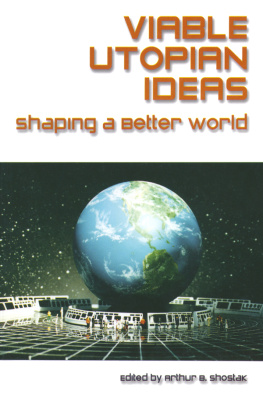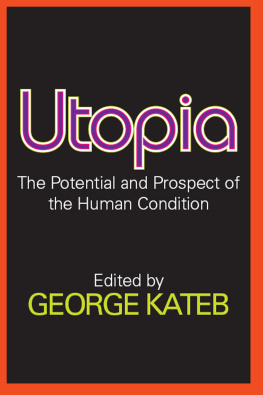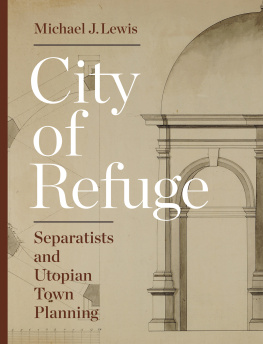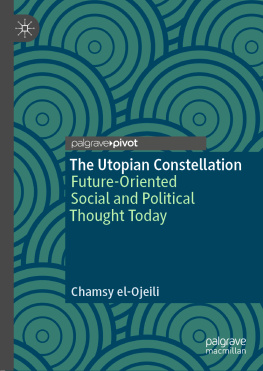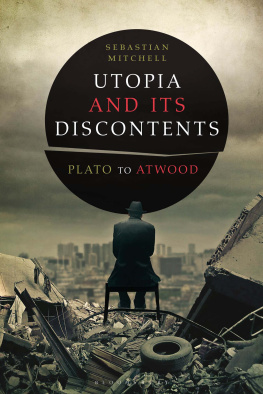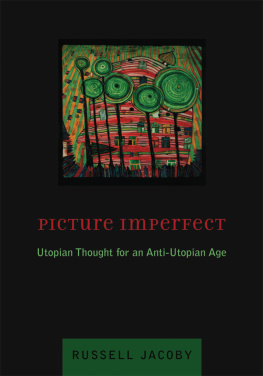Advance Responses to
Viable Utopian Ideas
Shaping a Better World
Art Shostaks editorship of essays on the intriguing concept of Utopia could not be more timely. By providing a forum for promulgating this powerful collection of utopian ideas from noted leaders right now, as the world seems to jolt from crisis to crisis, Shostak and his 47 erudite and creative contributors have offered up some desperately needed hope. This hope itself becomes the very seed for the full flowering of Utopia. Thus, I like to say that optimism is a moral imperative. This book, in addition to being highly instructive, is nothing less than an act of moral courage.
Dr. Rick Lippin, M.D., FACOEM, Tobyhanna Army Depot-Medical Officer
It is so refreshing to see the forgotten dream of Utopia resurrected in such a timely and compelling fashion. These thought-provoking essays give voice to the forgotten language of hope, dreams, and possibilities and make even the most jaded cynic take a few minutes to reflect upon what might be.
Sharon R. Pinnock, Labor Futurist and Director of Membership and Organization American Federation of Government Employees (AFGE)
Viable Utopian Ideas, a collection of essays written with the perspectives of an entering college student in mind, provides deep intellectual food at a time when we need it most. The tragedies and doubts caused by the terror of 9/11, major corporate betrayals, and intense struggles regarding educational equity are some of the fundamental issues facing us as we venture into this uncertain century. The books 47 essays should cause us to think more deeply and richly about who we are and where we want to go. Educators, in particular, need to be at the center of efforts to re-think our particular mission as the worlds supposed democratic superpower. Bravo for this effort to dream before todays realities claim all of our minds and souls. With effort like this, maybe we can create the future rather than simply react to the present!
Terry Furin, Saint Josephs University
Creating better futures is a critical task for us as individuals, through our organizations, and in our communities. Art Shostaks collection explores twenty-first century options for creating better futures as seen by a diverse group of academics, futurists, and visionaries. The various articles give much to think about, opportunities for disagreement, and the opportunity to enhance our own sense of utopiaand our role in creating it.
Clement Bezold, President, Institute for Alternative Futures
Utopia can be an intimidating word, suggesting a state of unattainable perfection. But scholars are coming increasingly to define utopia simply as a much better world, a world that for all we know may lie within our grasp. In Viable Utopian Ideas, people of many backgrounds offer their best thoughts on how we can bring utopia nearer, in our own lives, in our nation, on our planet, and even beyond.
W. Warren Wagar, Distinguished Teaching Professor of History Emeritus, Binghamton University, SUNY
Drenched as we are with news of corporate corruption, a widening rich-poor gap, church scandals, and fundamentalist fanaticism, it comes as a breath of fresh air to sample the utopian ideas in this book. Remembering that, even fifty years ago, concepts such as a manned landing on the moon, the Internet, and an integrated South Africa seemed utopian visions, we may find that some of the ideas broached here may also not be as remote as they now appear. There is much delicious food for thought in this volume.
Hal Linstone, Professor Emeritus of Systems Science, Portland State University
George Bernard Shaw is still remembered for his powerful statement: Some men see the way things are and ask, Why? I see the way things could be and ask, Why not? Art Shostak has brought together 47 varied, rich, and inspiring reflections on what could be and why not, touching such topics as ethnic conflict, outer space, poetry, the web, environmental degradation, and overpopulation.
Earl Babbie, Sociologist and Author
The faster you go, the more important is vision. When technological, economic, cultural and personal change happens as fast as it does today, we need to have a vision of where we are going, a beacon that guides us through the turbulence of rapid change. Viable Utopian Ideas: Shaping a Better World is such a beacon. It presents a wealth of ideas and visions for the future. It points to ideal and not-so-ideal futures (depending on your point of view) that will help us think about our own personal utopias and our own vision of what we want the world to be. As I see it, the concept of utopia is a tool we use for measuring ourselves and our society. It is a definition of successwhat the world should look like. This book is a valuable tool for helping us see and measure the health of our society.
Medard Gabel, CEO, BigPictureSmallWorld.com Author, Global Inc. An Atlas of the Multinational Corporation
When considering a new idea (or even revisiting one with fresh eyes), it is helpful to sample perspectives that stimulate, challenge, and otherwise develop ones own views. Viable Utopian Ideas provides a guided tour through more than a dozen significant lenses of creating a better world, covering the range from a personal future to societal change on a wider scale. This collection of essays is timely, easily accessible, and worthwhile.
Bill Ringle, Executive Director, LearnWell Institute, Philadelphia
Capturing and packaging many different perspectives on utopian thinking is a refreshing shift given todays high levels of uncertainty. We all need to have a dream about a utopian environment that propels us through the current struggles and gives us hope and energy to move forward. Such a collection of essays provides the opportunity to leap to the future. This can be particularly valuable in the business world today, which is full of uncertainty and lacks clarity. It permits thinking beyond what is to what can be and enables breaking through current business challenges.
Dudley P. Cooke, CEO, Liberty Business Strategies, Ltd., Ardmore, PA
Economists have a saying: In the long run we are all dead. This emphasizes attention only on todays problemsthe opposite of any discussion of utopian dreams or planning to forestall future societal concerns. This book is a welcome addition to counterbalance the prevalent American attitude of focusing on immediate issues. Focusing on a multitude of future issues from diverse vantage points can only be an endeavor of value.
Edgar Czamecki, Retired Assistant Education Director, AFL-CIO
Sanity is inevitable. Human beings will do the right thingafter theyve tried everything else. This collection of distinguished essays will play a part in keeping utopian thinking alive, and maybe even making it respectable.
Dr. Karl Albrecht, Futurist and author of Minds at Work: Leveraging the Power of Organizational Intelligence
Think of the varied images in this book as positive futures, hoping to be created. We all need to think beyond the frustrations of the present, to imagine what might be possible. While we cannot predict the future, we can help to create it. This book gives us some important clues about what could be created, and how.
Bob Johansen, President, Institute for the Future, Menlo Park, CA
This is an extraordinary and compelling set of essays, which address a range of issues. This books scope is a dreamers (in the sense that we should not lose our dream) delight. At a time when optimism is not as high as we would like to see it, this book offers many reasons for older adults (like myself) or young college students to think about how we might address some of the problems that face us as an idealistic nation.

